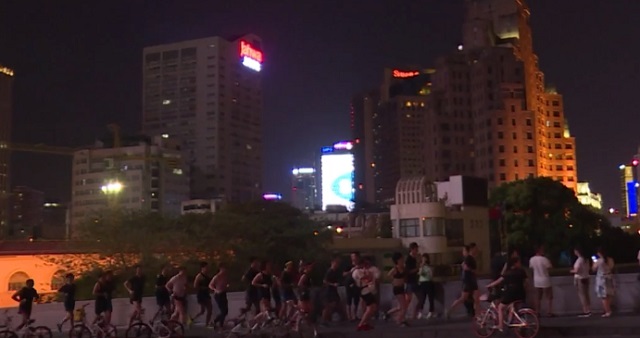
Shanghai, China | AFP | A group of elderly Chinese joggers are pounding along a deserted motorway when suddenly a taxi ploughs into the back of them, knocking them over like skittles.
At least one person was killed and the footage from the eastern province of Shandong went viral on Chinese social media.
Thousands die in road accidents every year in China, making the often congested streets a far from ideal place for running.
Add to that pollution and punishingly high temperatures at this time of year in many places, and even fanatics might be tempted to hang up their running shoes.
But a growing number of young, educated, urban Chinese are shrugging off the hazards to keep fit this way and the number of marathons and running events is mushrooming.
Shao Yanna is among a dozen men and women who as a group negotiate the busy streets of downtown Shanghai several evenings a week.
“If I don’t run for a long time I don’t feel so good and I will feel down, my emotions will go down and I won’t feel so efficient in my work,” the 29-year-old said, hopping from one foot to the other as her adrenaline surged.
Shao, a copywriter, shrugged off a recent Shanghai heatwave that saw temperatures reach a record 40.9 degrees Celsius (105 F).
“It’s hot and I will sweat a lot, but it’s fun and not a bad thing. It makes me feel alive and so powerful,” she said, her face glistening with sweat.
The air pollution that regularly chokes Chinese cities is another matter, and Shao consults a mobile phone app for a pollution reading before venturing out, training indoors if the measure surges too high.
– Odd looks –
In 2011 there was just 22 marathons, half-marathons or other running events held in China, according to the state Xinhua news agency.
But there will be more than 400 this year, according to the Chinese Athletics Association, and projections are for 800 by 2020.
Shao, who began running four years ago and has done more than 10 marathons in China and abroad, says she has witnessed a surge in the number of runners in China: “Running is kind of a fashion thing. If you run, you are fashionable.”
Yet for many Chinese, particularly the older generation or those from cities less cosmopolitan than Shanghai, running remains a baffling hobby.
Then there are the crowded streets and drivers unaccustomed to runners — as the elderly joggers in Shandong learned to their fate when they were mowed down last month by a preoccupied taxi driver.
Shao, who says she gets curious looks when she is running on the streets, is defiant.
She explained: “It makes me feel so proud of myself because I can do what they can’t.”
– Lifestyle choice –
At the Running Cat gym in Shanghai, coach Xu Yun is helping people improve their technique.
The 31-year-old agrees the sport has become “cool”, but also says growing numbers of young professionals want to sprint off the stresses of a hard day at the office.
China’s communist government supports the craze because it encourages healthier lifestyles, said Thomas Loeffler, chief financial officer for greater China of Messe Muenchen Shanghai.
Loeffler, whose German company organises sports trade shows, said it was more about lifestyle than health and not merely a fad.
“China’s middle class is becoming bigger and bigger and people can afford certain hobbies,” he said.
“Running is something that at the beginning was seen as a sport that can be done by everyone, but from studies we can see that people spend a lot of money on running shoes, clothes, bottles and wearable technology.”
Sales in China of sports apparel are booming and Nielsen, the trend tracker, said last year that the average expenditure of Chinese runners is 3,601 yuan (more than $500).
In China “a marathon is more like a fashion show”, Nielsen said, adding that 86 percent of marathon runners in the country are men, but women are increasingly participating.
Runners in China tend to be well educated and often hold senior positions in the workplace, said Loeffler.
And if they don’t, running might help: “Competition for jobs and universities is so high that people want to stand out of the crowd.
“Being a runner you have a chance to be different, to standout and achieve something that not everybody can achieve.”
RELATED VIDEO:
 The Independent Uganda: You get the Truth we Pay the Price
The Independent Uganda: You get the Truth we Pay the Price



